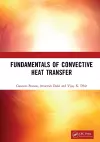
Fundamentals of Convective Heat Transfer
3 authors - Paperback
£47.69 was £52.99
Gautam Biswas is presently a professor of mechanical engineering at the Indian Institute of Technology (IIT) Kanpur. Previously, he was director of IIT Guwahati, and director of the CSIR-Central Mechanical Engineering Research Institute at Durgapur. He was the G.D. and V.M. Mehta Endowed Chair professor, and dean of academic affairs at IIT Kanpur. He served as a guest professor at the University of Erlangen-Nuremberg, Germany in 2002. Prof. Biswas was a Humboldt Fellow in Germany in 1987 and 1988 and an Invited Fellow by the Japan Society for the Promotion of Science in 1994. He is a fellow of the three major science academies in his country: the Indian National Science Academy, New Delhi, the Indian Academy of Sciences, Bangalore, and the National Academy of Sciences of India, Allahabad. He is a fellow of the Indian National Academy of Engineering, New Delhi and Institution of Engineers India, Kolkata. Prof. Biswas is a fellow of the American Society of Mechanical Engineers (ASME) and served as the associate editor of its Journal of Heat Transfer. He delivered the prestigious Prof. C.N.R. Rao Lecture in 2010. The Department of Science and Technology, India, awarded him the esteemed J.C. Bose National Fellowship in 2011. He is an associate editor of the journal Computers & Fluids. He has been conferred Honorary Doctorate by the Aristotle University of Thessaloniki, Greece in 2018.
Amaresh Dalal is an associate professor in the Department of Mechanical Engineering at IIT Guwahati. He earned a PhD from IIT Kanpur in 2009 and served as a postdoctoral research associate at Purdue University, Indiana in 2008 and 2009. Dr. Dalal’s research focuses on computational fluid dynamics and heat transfer, finite volume methods, unstructured grid techniques, and multiphase flows. He is presently developing a versatile and robust computational fluid dynamics solver over a hybrid unstructured grid. The programming paradigm is intended to solve a wide range of problems in the areas of real-life fluid flow, heat transfer, and transport phenomena involving complex geometries. Dr. Dalal won the Prof. K.N. Seetharamu Medal and Prize for the Best Young Researcher in Heat Transfer from the Indian Society of Heat and Mass Transfer in 2017.
Vijay K. Dhir is a distinguished professor of mechanical and aerospace engineering and former dean of the Henry Samueli School of Engineering and Applied Science at the University of California Los Angeles (UCLA). Before being named dean, Prof. Dhir served as vice chair and chair of the Department of Mechanical and Aerospace Engineering. Dr. Dhir’s efforts earned international recognition for the university’s engineering school and made it a hub for interdisciplinary education and research. He leads the Boiling Heat Transfer Laboratory at UCLA. Its pioneering work in fundamental and applied sciences involving efficient heat removal through boiling gained international attention when NASA chose one of his research teams to conduct experiments on the International Space Station. They demonstrated the effects of microgravity on boiling. In 2006, Prof. Dhir earned one of the most prestigious honors for engineers. He was awarded membership in the National Academy of Engineering for his achievements in boiling heat transfer and nuclear reactor thermal hydraulics and safety. He received the Max Jakob Memorial Award; the American Society of Mechanical Engineers (ASME) Heat Transfer Memorial Award; the Donald Q. Kern Award of the American Institute of Chemical Engineers; and the Technical Achievement Award of the American Nuclear Society. Prof. Dhir has been a senior technical editor of ASME’s Journal of Heat Transfer since 2000 and received its Best Paper Award twice. He serves on advisory boards of several other journals. His many areas of interest include two-phase heat transfer, boiling and condensation, thermal and hydrodynamic stability, thermal dynamics of nuclear reactors, and microgravity heat transfer. The Boiling Heat Transfer Laboratory is currently studying flow boiling, microgravity boiling, and thermal hydraulics of nuclear reactors.